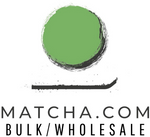Our Bulk Matcha Quality Assurance
Certifications & Quality Control

At Matcha.com, we uphold the highest standards for producing and manufacturing the best-quality Japanese matcha and other teas. All of our products and each batch of matcha we produce undergo very stringent independent lab testing by some of the world's leading experts in food safety regulations.
With matcha gaining more and more popularity being sold at supermarkets, health food stores, cafes, and restaurants, we have ensured our safety standards keep up with the rising wholesale and bulk demands. Matcha.com’s tea production is highly regulated and closely monitored, from our growing methods to our harvesting, storage, and packaging.
As a premium matcha supplier to wholesale and bulk manufacturing, we meet all of the strict safety certifications around matcha and our bulk teas — attaining all the hygiene demands required to produce the best-quality Japanese-grown matcha you can get.
You can learn more about our various quality-control certifications below.
The Food and Safety Inspection Service (FSIS) of the United States Department of Agriculture develops and provides labeling guidance on policies and inspection methods to protect consumers from untruthful and misleading labels. According to the FSIS, Teas that carry the USDA label must apply "cultural, biological, and mechanical practices that promote resource recycling, promote ecological balance, and conserve biodiversity." By having a USDA organic label, you have a certification that verifies consumers are protected from potential exposures to harmful pesticides and environmental toxins by the national organic program (NOP). Your customers can have the sound of mind that your tea has met the strict standards set by the U.S. for genuinely organic produced products with this certification.
ORGANIC CROP IMPROVEMENT ASSOCIATION (OCIA)
The Organic Crop Improvement Association (OCIA) is a non-profit, member-run, and owned organization that provides research, education, and certification services to organic producers around the globe. As one of the world's oldest and more recognizable certifications in the organic certification industry, an OCIA certification shows that a company is committed to environmental sustainability and environmental stewardship.
The Canada Organic Regime (COR) has set a standard for imported organic products and must be certified by a certification body accredited by counties such as Japan. COR is the federal program that regulates Canadian organic products and has an equivalence agreement between the E.U. and several other countries. So, for example, for tea to carry the COR organic label — it can be USDA organic.
FSSC 22000 is a global non-profit and independent scheme owner that provides trust and makes a difference in protecting consumers in the consumer goods industry. FSSC has a three-year auditing process to acquire a certification that significantly emphasizes a company's food safety management system. From the first contact with the soil to the final stages of packaging, storing, and shipping bulk and wholesale matcha, an FSSC 2200 certification ensures manufacturers have met the highest safety and hygiene requirements.
The Orthodox Union (O.U.) has the most trusted kosher certification in the U.S. An O.U. symbol indicates that a product contains neither dairy nor meat — including any meat or dairy derivatives and is considered 'Pareve.' The origins of food safety standards set by the O.U. originate from the Bible and Jewish traditions. The aim is to avoid cross-contaminations of certain food products such as meats, milk, fish, edible oil, and other essential oils.
The Japan and Natural Foods Association (JONA) has a certification program that is an equivalency certification often needed by importers to import tea from Japan to regions like the U.S. and Canada. Conducting third-party, organic certifications since 1993 and accredited to IFOAM (International Federal of Organic Agriculture Movements), JONA has a JONA original certification, an organic JAS certification (which we talk about in its section), and also helps companies meet standards for international organic certifications outside Japan.
The Organic Japanese Agricultural Standards (JAS), established by the Japanese Minister of Agriculture, Forestry, and Fisheries, is the USDA organic equivalent in Japan that ensures food safety with the highest certification standards. Teas that feature the JAS label conform to high standards for quality, production process, methods of handling, business management, and even performance evolution. An Organic JAS label means grade quality, composition, and specification have all been evaluated to meet a set standard. Any products produced in Japan can't be labeled organic without featuring an Organic JAS logo.
You can sell your organic products commercially within the European Union by having an Organic Agriculture Europe certification. An E.U. Organic certification guarantees the absence of GMOs, climate and environmental protection, preservation of biodiversity, respect for natural cycles and animal welfare, no trace of chemical or synthetic products, the conservation of soil fertility, and transparent labeling of products for consumers. To obtain the green E.U. Organic logo, you must be certified by a certification body.
SGS is the world's leading inspection, verification, testing, and certification company. We employ SGS's specialist audit service team that helps us stay up to date in all the latest certifications and standards in our sector — ensuring that our products, processes, and operations all meet and exceed market regulations and standards required. Regular audits by SGS allow us to offer our wholesale and bulk customers a premier global production experience.
HAACP is a management system for which food safety is addressed by analyzing chemical, biological, and physical hazards from raw material production. So with our matcha and other tea varieties, you can rest assured you don't need to worry about any radioactivity, pesticides, heavy metals, or microbial. Our matcha is rigorously tested and pure.
Good Manufacturing Practice (GMP) describes the minimum standard that a medicine manufacturer must meet in their production process. Even though tea is not considered a medicine, we know it has incredible healing powers and properties, so we treat it as such and coordinate inspections to verify compliance with these standards. In addition, we make sure that our teas are consistent and of the highest quality, are appropriate for their intended use, and reach the requirements for marketing authorization or clinical trial authorization.





